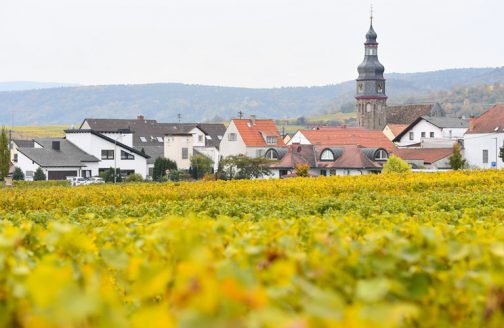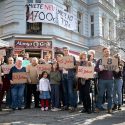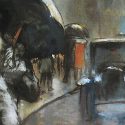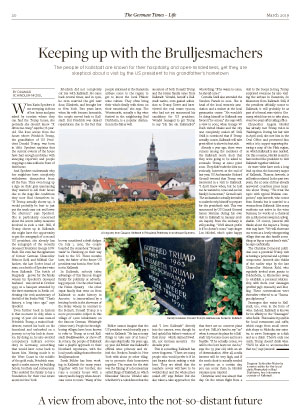The people of Kallstadt are known for their hospitality and open-mindedness, yet they are skeptical about a visit by the US president to his grandfather’s hometown

When Karin Speckert is out sweeping in front of her home and gets asked by tourists where they can find the Trump house, she pretends she doesn’t know. “It drives me crazy,” says the 76-year-old. She lives across from the house where Friedrich Trump, the grandfather of US President Donald Trump, was born in 1869. Speckert explains that the current owners of the house have had enough problems with annoying reporters and people stopping to take selfies in front of their home.
And Speckert understands why her neighbors have completely withdrawn themselves from all the fuss. They even hung up a sign on their gate announcing they wanted to sell their house due to the siege-like conditions they now find themselves in. “If Trump actually shows up, it would probably be best to just put the trash cans out and lower the shutters,” says Speckert. She is particularly concerned about the severe safety measures involved in such a visit. Still, if Trump shows up in Kallstadt, she might have the opportunity to get the autograph of a second US president; she already has the autograph of the recently deceased President George H.W. Bush. She even has the signatures of former German Chancellor Helmut Kohl and Mikhail Gorbachev, the last Soviet head of state, on a bottle of Speckert wine from Kallstadt. The bottle of Burgundy – grown for the family winery by Speckert’s deceased husband – was served in October 1999 at a banquet attended by the three statesmen in Berlin celebrating the 10th anniversary of the fall of the Berlin Wall. “That’s history, a long time ago,” says Speckert.
Even further back in history is that moment in 1885 when a young 16-year-old man named Friedrich Trump, a trained hairdresser, turned his back on his homeland and embarked on a journey to try his luck in America. By doing so, he also avoided compulsory military service duty in Germany, something that would later come back to haunt him. Having made it to the West Coast in the middle of the gold rush, Friedrich managed to make money by building hotels, brothels and restaurants. This enabled the family to lay a foundation for their real estate assets in New York.
Friedrich did not completely cut ties with Kallstadt. He came back several times, and in 1902, he even married the girl next door, Elisabeth, and brought her to New York. Two years later, when his wife became homesick, the couple moved back to Kallstadt. But Friedrich was denied repatriation due to the fact that he was considered a draft dodger. On July 1, 1905, the couple boarded the steamboat “Pennsylvania” in Hamburg on their way back to the US. Three months later, the father of the future US president was born in New York – not in Kallstadt.
In Kallstadt, nobody takes advantage of this famous émigré family for publicity or advertising purposes. On the other hand, the Heinz dynasty – the other expat family that went on from Kallstadt to make history in America – is immortalized by a ketchup bottle in the showcase of the Heinz winery. In contrast to the Heinz’s, Donald Trump is a more provocative subject in this village of 1,200 inhabitants on the famous German Weinstraße (wine route). People in the neighboring villages have been known to refer to Trump as a real Kallstadt Brulljesmacher, or show-off. In return, the people of Kallstadt take a playful approach to their blowhard reputation, with the local youth calling themselves the Brulljesmachers.
Sarah Bühler has been working in Kallstadt for many years. Together with her brother, she runs a country house with a winery and is happy when Americans come to town. “Many of the people stationed at the Ramstein airbase come to the region to get to know the local Pfälzer wine culture. They often bring their whole family with them on their excursions,” she says. The Wurstmarkt, actually a big wine festival in the neighboring Bad Dürkheim, is a popular destination in the fall as well.
Bühler cannot imagine that the US president would actually pay a visit to Kallstadt. “He has so many things to take care of at home,” she says skeptically. Six years ago, 29-year-old Bühler was Kallstadt’s official wine princess and visited the Steuben Parade in New York with about 30 other villagers to promote their hometown together. The reason for the visit was the filming of a documentary called Kings of Kallstadt, in which filmmaker Simone Wendel asks whether it’s a coincidence that the ancestors of both Donald Trump and the Heinz family came from Kallstadt. Wendel, herself a Kallstadt native, even gained admission to Trump Tower and interviewed the real estate tycoon, who had not yet announced his candidacy for US president. Wendel managed to get Trump to say “Ich bin ein Kallstadter” and “I love Kallstadt” directly into the camera, even though he had upheld his father’s version of their story – which claimed Swedish, not German ancestry – for decades prior.
This is something Kallstadt has never forgotten. “There are many people who would prefer it if he just forgets about making a visit here. They are afraid that the manhole covers will have to be welded shut and the whole place sealed off,” says Bühler. But she also takes a calm approach to the whole thing: “If he wants to come, he should come.”
Cornelia Seidl also attended the Steuben Parade in 2012. She is head of the local women’s association and a trainer at the local gymnastics center. “He wouldn’t be doing himself or Kallstadt any favors if he comes,” she says with a view to 2005, when George W. Bush visited Mainz and the city was completely sealed off. Still, Seidl is convinced that if Trump actually comes, Kallstadt will take great effort to show its best side.
Already a year ago, there were rumors among the members of the Kallstadt men’s choir that they were going to be asked to serenade Trump at some point soon. They didn’t take the idea too seriously; however, at the end of last year, US Ambassador Richard Grenell tweeted that Trump was interested in a visit to Kallstadt. “I don’t know when, but he told me he wanted to come and see his family’s hometown,” Grenell said. The ambassador actually intended to make the trip himself to prepare for the president’s visit. This was announced by US Consul General James Herman during his own visit to Kallstadt in January 2018. An inquiry from the embassy is still pending. “We’d almost prefer it if he doesn’t come,” says singer Leo Möckel, who’s quite happy that there are no concrete plans as of yet. Still, it’s hard to say “no” when it seems the plans for a Kallstadt trip become more and more feasible. “If he actually comes, we will be the best hosts we can be,” says the 79-year-old, with an air of determination. After all, media interest will be very high, and if the men’s choir is actually needed to perform on a certain day, you can count them in. Möckel remains open-minded.
Christmas 2018 was almost that day. On the return flight from a visit to the troops in Iraq, Trump surprised everyone by also visiting the airbase in Ramstein, 60 kilometers from Kallstadt. Still, if the president officially comes to Kallstadt, it will probably be as part of a formal state visit to Germany, which has yet to take place, even two years after taking office.
Chancellor Angela Merkel has already met Trump twice in Washington. During her last visit in April 2018, she met him in the Oval Office and presented him with a 1705 copper engraving featuring a map of the Pfalz region, on which Kallstadt is also marked. On this occasion, Merkel is said to have invited the president to visit Kallstadt together with her.
As state visits have such a long lead-up time, the honorary mayor of Kallstadt, Thomas Jaworek, is still rather relaxed. In the past two years, the 50-year-old has already answered countless press inquiries about Trump. “We treat the topic with typical Pfalzian composure,” says Jaworek, who comes from Bavaria but is married to a woman from Kallstadt. Like many residents not active in the wine business, he works at a chemical site 25 kilometers away in Ludwigshafen. Of course, Jaworek still thinks about the impact a Trump visit may have. “We will showcase our town as a lovely winegrowing village that can also handle something as big as a president’s visit,” he says confidently.
The Christian Democrat politician sees a potential Trump visit as having a personal and a private component. Jaworek also thinks of the earlier trips by the late Chancellor Helmut Kohl, who regularly invited state guests to Deidesheim, 15 kilometers away, to establish a personal relationship with them over Saumagen (stuffed pig’s stomach) and Riesling. These conversations were thereafter referred to as “Saumagen diplomacy.”
Saumagen also exists in Kallstadt, too, even in the form of wine. Indeed, Kallstadt is known for its affinity to the “Saumagen” wine fields. This makes it possible for local restaurants and cafés, which range from small streetside shops to Michelin star eateries, to serve Saumagen as a dish and as a drink. There’s only one catch: Trump doesn’t drink wine. “We’ll be able to accommodate that too,” says Jaworek.
Dagmar Schindler-Nickel
is a metro editor for the local daily Rheinpfalz in Bad Dürkheim, two kilometers outside of Kallstadt.




